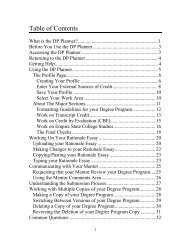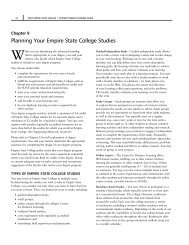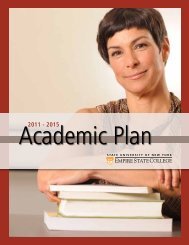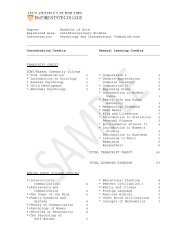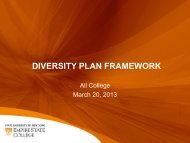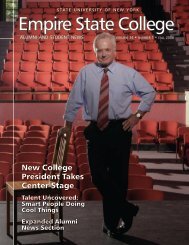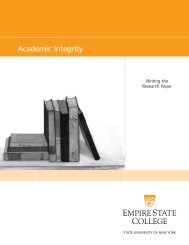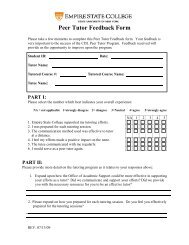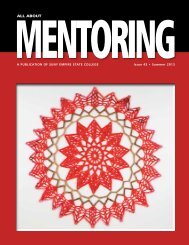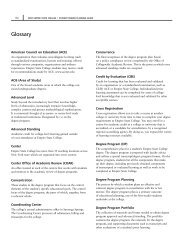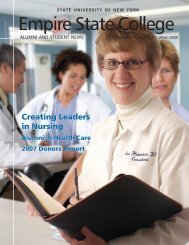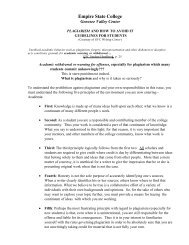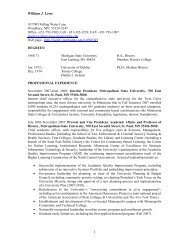All About Mentoring Spring 2011 - SUNY Empire State College
All About Mentoring Spring 2011 - SUNY Empire State College
All About Mentoring Spring 2011 - SUNY Empire State College
You also want an ePaper? Increase the reach of your titles
YUMPU automatically turns print PDFs into web optimized ePapers that Google loves.
57<br />
Reflections on a Journey of Learning<br />
to Adjust My Blind Spot<br />
Heidi Nightengale, Central New York Center<br />
As a faculty mentor with the<br />
Auburn Unit of the Central New<br />
York Center, one of the studies<br />
that I guide involves investigation into the<br />
work of Daniel Goleman. Goleman made<br />
his theoretical research about emotional<br />
intelligence both groundbreaking within<br />
the academy and accessible to those outside<br />
the academy who grabbed his books off<br />
the shelves of local bookstores and helped<br />
him become a New York Times best-selling<br />
author.<br />
Goleman’s work caught my attention as an<br />
administrator of not-for-profit organizations<br />
in the 1990s, years before I came to<br />
<strong>SUNY</strong> <strong>Empire</strong> <strong>State</strong> <strong>College</strong> in the mentor<br />
role. Goleman speculated that emotional<br />
intelligence (EQ) far out-predicted the<br />
likelihood of life success at home, in school,<br />
in the community and in the workplace<br />
than its counterpart, the long validated<br />
intelligence quotient (IQ) and its well<br />
established testing methodologies used to<br />
arrive at a static IQ.<br />
At the heart of Goleman’s work was a<br />
series of competencies. I studied them.<br />
I pondered them. I wondered if I had<br />
them. He postulated that personal and<br />
social competencies such as empathy, selfawareness,<br />
self-control, social skills and<br />
motivation were far greater predictors<br />
of happiness and success than the IQ. In<br />
his ground breaking book, Emotional<br />
Intelligence: Why it Can Matter More than<br />
IQ (1995), Goleman details these personal<br />
and social competencies and argues that the<br />
common link between them and emotional<br />
intelligence is the concepts of compassion<br />
and humanity.<br />
The hallmark of these competencies for<br />
me was empathy. Even Goleman admits<br />
that while this is a fluid, developing<br />
and developable competence, he knows<br />
little about how one comes to become<br />
empathetic. Still, it is this competency and<br />
my on-going reflection on it that led to the<br />
work for which I was honored to receive<br />
the Altes Prize for Exemplary Community<br />
Service last year. That is, it was Goleman’s<br />
thinking about empathy that led me to a<br />
movement away from a personal blind spot<br />
I had been hiding.<br />
Early on, I found myself emotionally,<br />
physically and spiritually impacted by<br />
remarkable people, mostly young people,<br />
who came into my life nearly always<br />
through a serendipitous series of events.<br />
Heidi Nightengale (left)<br />
Phone calls from local school administrators<br />
would indicate that a teen and senior at<br />
the high school district was homeless. At<br />
the very least, high school graduation was<br />
at stake, as the adolescent had aged-out of<br />
any intervention from the local department<br />
of social services. Without shelters and<br />
programs for theses girls, my home could<br />
provide a refuge from the streets and could<br />
offer routines and safety to help them<br />
remain in school through high school<br />
graduation and beyond. In an underground<br />
railroad of sorts, the first call from a<br />
frustrated school administrator (someone<br />
who could not get law enforcement, social<br />
services or not-for-profit human service<br />
agencies to respond) prompted that first<br />
sheltering experience. Several more young<br />
girls followed to cross the Finger Lakes<br />
Railroad tracks to my home.<br />
But my blind spot was showing up<br />
emotionally. Why did I want to do this<br />
work Did I house these youths and try to<br />
provide for their emotional, nutritional,<br />
educational and other developmental needs<br />
because of a narcissistic need to receive<br />
accolades Did I simply want to feel good<br />
about myself more than feel connected to<br />
the whole village ideology that in other parts<br />
of world society creates a quiet stepping up<br />
to just take care<br />
As my work continued, I found my answers<br />
following the path of discovering and<br />
exercising my emotional intelligence.<br />
suny empire state college • all about mentoring • issue 39 • spring <strong>2011</strong>



